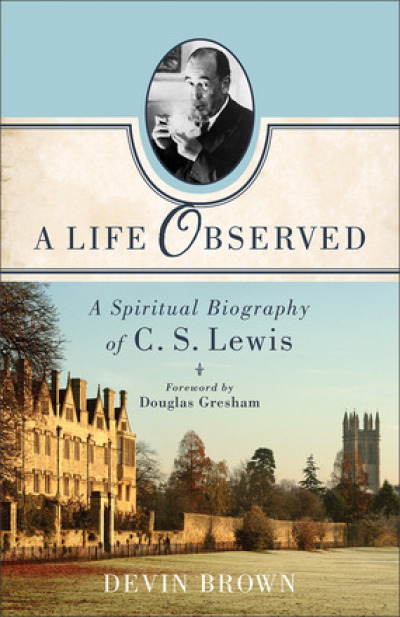New Spiritual Biography of C.S. Lewis Focuses on How Atheist Loner Changed to Joyful Christian

A new spiritual biography of the great Christian scholar and author C. S. Lewis, released in anticipation of the 50th anniversary of his death, portrays a man utterly transformed by his conversion to Christianity – only in Jesus did this proud loner find friends, joy, and laughter.
"If you listen to the people who actually knew Lewis, his whole life is full of joy and laughter – after he became a Christian," Devin Brown, professor of English at Asbury University and author of A Life Observed: A Spiritual Biography of C. S. Lewis, told The Christian Post in a Wednesday interview. His major takeaway from 15 years of studying Lewis is that the Chronicles of Narnia author's gradual conversion fundamentally transformed his life from sorrow into joy.
"Before he became a Christian, he had one neighborhood boy who was his friend, but more of a pen pal, and his brother – he just liked being around with his books," Brown explained. The young Lewis was proud of being smarter than others, and that isolated him. Although the Oxford don was an atheist, he found the "hard reality of atoms and molecules" quite dull.
Lewis didn't turn around in a day, his conversion took at least two stages and more than a year, Brown noted. Even after Lewis rejected materialism, admitted God was God, and became "the most reluctant convert in all of England," he was still not yet a Christian.
While at Oxford, Lewis came in contact with strong believers. "All the books he seemed to like were written by Christians and all the friends he liked were Christians," Brown explained. Through a sort of "good infection," like the one Lewis wrote about in Mere Christianity, he finally accepted the saving grace of Jesus Christ.
Then Lewis' joy blossomed, the biographer explained. "You get a taste of it in Narnia," he said, noting that when the White Witch is dethroned, the whole world takes on a tone of "celebration, merriment, laughter, joy."
"We often as Christians save these things for holidays and birthdays, and they should be a part of every day," Brown argued. Many non-Christians see believers as legalistic, judgmental, and sad, but the true heart of the Bible and the Holy Spirit is joy, the biographer argued. Christians should live out an infectious love of God that shines deep-seated delight from the heart.
After Lewis converted, his reading remained important, but he began to deepen the friendships in his life and to allow his experiences to affect his writing. Brown paraphrased a telling passage in the introduction of the Screwtape Letters, where Lewis wrote that he had something "better than books if you want to learn about how temptation works and evil works – my heart, my own heart."
That heart also knew sorrow, following the death of Lewis' wife, Joy Gresham. "The answer is not that if we were God-like or Christ-like we would not have any anguish," the biographer acknowledged. But even that pain can bring us closer to God, as the Oxford don wrote in A Grief Observed, a book Lewis wrote in one sitting. Brown paraphrased Lewis again, saying "Man, am I glad that we have story of Jesus in Gethsemane!"
The biographer noted that many biographies have already been written about the famous author of The Chronicles of Narnia, but he said that his is unique because it focuses on the spiritual aspect of the man's life – the part that even Lewis would have called most important. "I don't know that anybody's actually focused on his spiritual journey," Brown said. He mimicked the title of one of Lewis' most personal books in order to emphasize that his biography breaks through to the kernel of the scholar's relationship with God.
Brown testified that Lewis became more and more humble throughout his life. In the last book the Oxford don published, Letters to Malcolm, his joyful confidence in God shines through. "All these speculations, they're just guesses. I could be wrong. But if I'm wrong, the truth is even better than what I'm thinking," Devin paraphrased.



























